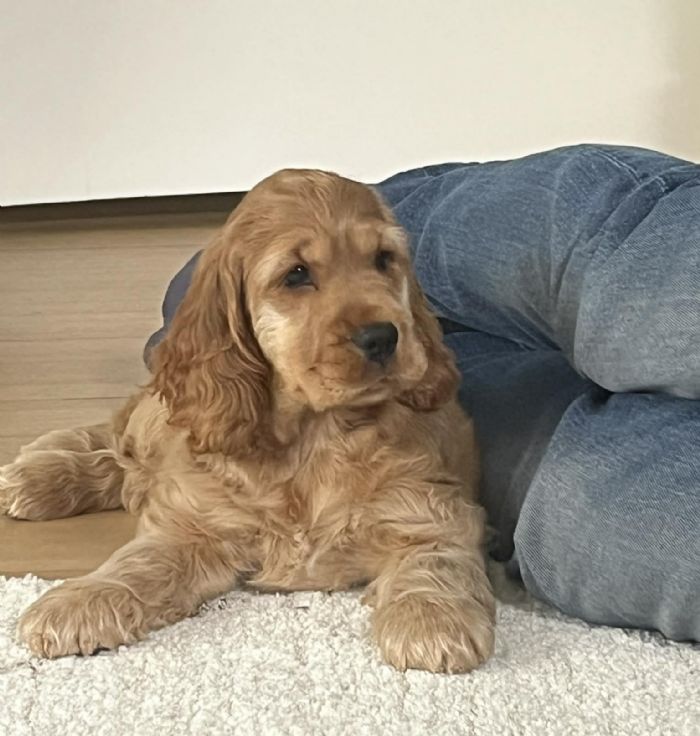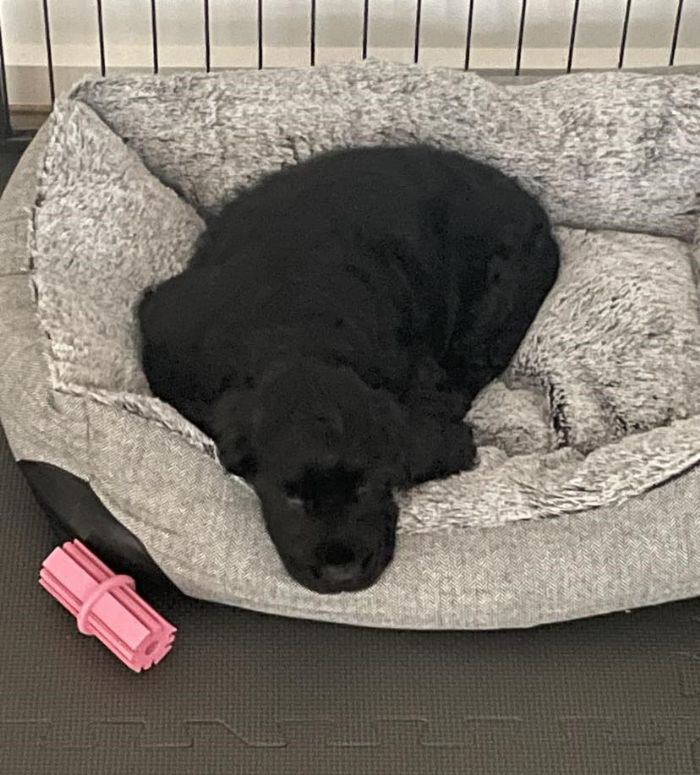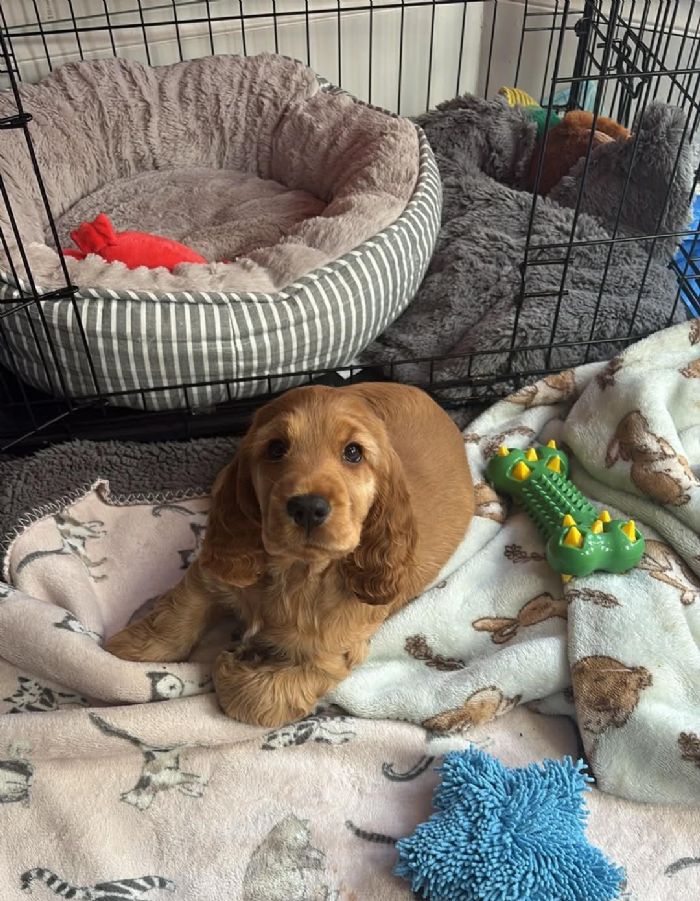BRINGING YOUR PUPPY HOME

Tess
Be Prepared
This is probably the most exciting and long anticipated day for you. Finally, your puppy is ready to join the family! Keep in mind that for the puppy, this day will be the most traumatic and overwhelming experience of its life.
Before you pick up your new puppy you will have already organised:
1. a bed and safe place to sleep
2. a food dish and water dish
3. food, preferably the same as the breeder is feeding.
4. a preferred toileting area
5. some toys for the puppy to play with
6. a secure house and back yard. Puppies love to explore, dig and chew. Dangerous items such as electrical cords, batteries, cleaning products etc must be out of reach. Put precious things away until your puppy is older.
Please consider the following rules to minimise the trauma and help make it a good and safe experience.
Provide A Safe Spot
You will have organised bedding for your new puppy. This bedding will become familiar to the puppy, and provide a sense of security. This bedding should be placed in the puppy’s bed area, which should be available to your puppy at all times as a safe retreat. If you are using a crate, place the bedding in there and drape a blanket over the crate, to make a “den” or “cave”.

Jasper
Stay With Your Puppy
You are the new guardian of your puppy, so initially you will need to stay with it so that it knows this and bonds with you.
Keep It Calm
Your home environment will be vastly different to what the puppy is used to. By keeping a calm atmosphere, you will enable the puppy to feel safe and not overwhelm its senses, which will encourage it to explore its new surroundings.
Keep Visitors To A Minimum
As excited as you and your friends and family might be, it is better to keep visitors to a minimum for a couple of days to allow your puppy to settle in a bit. We all get excited about puppies, and if you do this right, the puppy will be excited about meeting them also, in a couple of days when they feel more secure.
Introduce Other Pets Carefully And Slowly
New animals, whether it be dogs, cats or others, should be introduced slowly, as to not overwhelm the puppy, and create a bad situation. If the puppy is backing off, let them retreat to a safe spot. They might just need some time to observe their new friends from a safe distance first. The same goes for the existing pets. Give them time to adjust to the new family member too. Don’t force them to become “best friends” immediately. Make every experience a good one. If you think the puppy is scared or overwhelmed, you are probably right. Your job is to reassure the puppy and make it feel safe.
End On A Good Note
Puppies sleep a lot. When something has gone really well, or the puppy has had its short burst of play or exploration, take it back to its bed for a cuddle and a nap. It will soon learn where its bed is, and a self-regulating dog is priceless.
Set Family Rules
Make sure all the members of the family know and agree to the same rules so that everything is consistent and the puppy is not confused.
It is important to understand that as much as you want your new puppy to be a part of your family, your puppy is still an animal and you need to set boundaries and rules right from the start. In fact, most puppies feel more secure when they know their place. Dogs that are not well disciplined can wreak havoc on a home.
The most important thing you can do with your new puppy besides introducing a “safe spot”, installing a toileting routine and teaching your puppy what “No” means, is to build a relationship with your new puppy. Love your puppy, because they deserve the very best! Get on the floor and play with your puppy. The bond will grow and your puppy will love you. This will make your puppy want to please you and be obedient as well which will also make it easier when you teach your puppy other basic commands.
Housing
It is an expectation that your puppy is housed very well, and preferably inside. Cocker spaniels thrive on being a true part of the family.
Keep them warm. Puppies like to be snug and warm. During the day, they are happy to be outside in the yard, but as night falls, especially in the colder months, they appreciate coming inside. Obviously, also, keep them free from drafts.
.jpg)
Charlie
Provide Soft, Clean Bedding
Puppies bedding has to be suitably thick, soft and clean for them to be comfortable.
To crate or not to crate. Crating works very well if done and used correctly, and is very handy in the early days as a safe spot for your puppy, will help in managing toilet training, and for bed and confinement purposes. It is also very handy when staying away from home: staying at friend’s houses, holidays, moving house, staying at a kennel - consider it a portable bedroom.

Lola
Behaviour and Personality
All puppies have a wonderful range of personalities. They should be loyal, confident, calm, affectionate and goofy. However, they are also prone to some negative behaviours. After all, it is better to get in front of a rolling ball, than to chase after it.
Destructive Behaviours
All puppies are renowned for their destructive behaviour. They will chew and pull apart anything you have left with them. Left alone in the family room they will chew the cushions and pull out the stuffing, chew the throw rug, your favourite shoes or the kitchen chair. In the yard, they will dig holes and lie in them, or dig down their bones and leave them there until they are really stinky. And they will steal food off the kitchen counter. All dog owners will willingly share very similar tales. The good news is that they grow out of it, but not very quickly. By providing appropriate and enriched environments for them, you can save yourself a lot of trouble.
If you catch your puppy chewing on something they shouldn’t, a firm “NO” is required and then give your puppy their own toy to chew on.
Enrich Their Environment
Puppies sleep a lot, however, when they are not asleep, they like to keep themselves occupied and entertained. If you have not considered this, and taken it into account, be prepared to have a lot of your property destroyed. They like to chew so provide appropriate chew toys and bones for them to chew on. They like to pull things apart, so DON’T put the new expensive bed out in the yard with them, but rather an off the ground bed that the cover can be easily replaced or a solid kennel with comfortable blankets for them to rest on until their destructive days are over.
Provide lots of engaging and interactive toys (stuffed Kong toys, ice blocks with titbits in it, etc.). Anything you do not want to be destroyed; put it away.
Play Rules
We love playing. It is great fun, but it is wise to have some very clear ground rules.
No Mouthing On Hands
Whilst it can be cute to play mouthing games with a puppy (despite their razor sharp teeth), it blurs the appropriate threshold for mouth/ human skin contact for the puppy. Later, this can be the difference between a dog that snaps and bites in a bad situation, and one that doesn’t.
No Jumping Up
Don't let the puppy jump to greet you unless you are perfectly happy to let your fully grown dog do the same to yourself, family and visitors in two years time. One thing is teaching your dog to do this on command, as a trick, it is completely another to have an out-of-control dog that you end up yelling at every time he is happy and wants to greet you the way you have inadvertently taught him.
Exercise
Puppies do not mature until 12 months of age and it is important that they do not experience excessive walking, jumping or running. The exercise needs to be regulated and limited whilst the puppy is growing and developing to avoid structural harm to developing bones and muscular systems and until their growth plates are closed. The best exercise for a growing puppy is play and gentle walking for short periods.
Developing and growing puppies should not be intentionally subjected to exercise that they cannot regulate themselves. Simply put, this means that they can play and go for walks, but should not be subject to high impact activities such as jogging, hiking, running along bikes etc, leg twisting activities or leaping after flying disks and over jumps until they are fully matured. Puppies should not be encouraged to jump down from heights as this can cause damage to bones and muscular systems.
